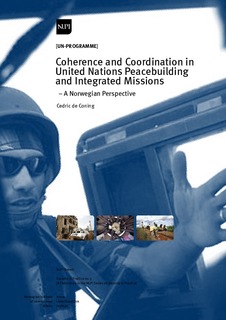Coherence and Coordination in United Nations Peacebuilding and Integrated Missions – A Norwegian Perspective
Research report

View/
Date
2007Metadata
Show full item recordCollections
- Security in Practice [61]
Abstract
This report analyses the coherence and coordination dilemma in peacebuilding systems,
with special reference to the UN integrated missions concept. It argues that all peacebuilding agents are interdependent in that they cannot individually achieve the goal of the overall peacebuilding system. Pursuing coherence helps to manage the interdependencies that bind the peacebuilding system together, and coordination is the means through which individual peacebuilding agents can ensure that they are connected to the overall strategic framework process that binds the peacebuilding system together. The report is focussed on two areas where the lack of coherence holds the most promise
for improving peacebuilding coherence. The first is the need to generate a clearly articulated overall peacebuilding strategy. The second is the need to operationalise the principle of local ownership. The report argues that without meaningfully addressing these shortcomings peacebuilding systems will continue to suffer from poor rates of sustainability and success.
Publisher
Norsk Utenrikspolitisk InstituttSeries
Security in Practice;5 - 2007NUPI Report;
UN Programme;
